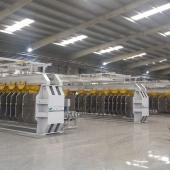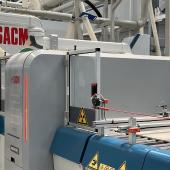Acimac: the future of building lies in BRIC countries
The growth of the construction industry will be driven by the BRIC countries (Brazil, Russia, India and China, the new masters of the world economy) and Turkey. Italian businesses must seek to grasp this opportunity by establishing a local presence in these countries and intensifying the final stage in the chain of value, namely after-sales support. This was the major theme that emerged at the conference entitled "Scenarios and prospects for world building" organised by Acimac on 12 June. Held at the association's headquarters, Villa Marchetti in Baggiovara, the event featured talks by a number of illustrious guest speakers who discussed present and future scenarios and offered some guidelines for businesses with activities linked to the construction sector.
After the opening remarks by Acimac's outgoing chairman Pietro Cassani, first to speak was Confindustria chairman Giorgio Squinzi. "Our country has two key strengths: manufacturing excellence and the resourcefulness of its entrepreneurs," he said. "In spite of the current difficulties, we must believe in what we are doing and invest in our companies." For this purpose, Squinzi declared that he intends to work hard during his term in office to relaunch the reference sectors for the entire supply chain, including fashion, interior design, furnishing and mechanical engineering - sectors that have achieved outstanding standards of excellence.
Giuseppe Schirone and Luca Ugolini presented the results of a study conducted by Prometeia which predicts that the domestic Italian market and Western Europe will undergo further contraction whereas 40% of investments in construction will be concentrated in the BRIC countries. North Africa and the rest of South America are other areas offering good prospects.
A talk discussing the situation in Turkey was given by Zeynep Bodur, chairman of the Turkish Ceramics Federation, who pointed to the high growth rates in her country in recent years (the fifth largest economy in Europe, 15th in the world) and noted that the contraction of the European market (Turkey's leading export and trade partner) has caused the local economy to slow slightly. Nonetheless, the country is expected to experience 7.7% growth between 2011 and 2017 and to implement major investment programmes in residential building, infrastructures, transport and industry.
According to Shreekant Somany, chairman of the Indian Council of Ceramic Tiles and Sanitaryware ICCTAS, "India will experience 100% building sector growth over the next decade. It is estimated that around 300 million people will move to cities by 2030, prompting a need for large-scale urbanisation projects." Repeatedly stressing the importance of sustainable building, Somany noted that more than 620 billion dollars of building investments are planned between 2016 and 2017 in India.
Fabio Tarozzi, newly appointed chairman of Acimac, brought the conference to a close by stressing the importance of being "glocal", a play on words that combines the need for a global vision with a local presence.
Did you find this article useful?
Join the CWW community to receive the most important news from the global ceramic industry every two weeks





















